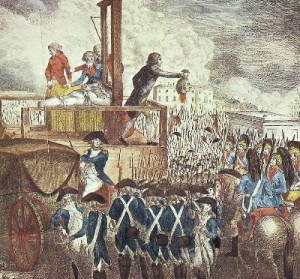When Thomas Jefferson was sworn in as the nation’s third President in 1801,  much of the civilized world was shocked. The aristocracy of Europe, still mocking the quaint American concept that common people could govern themselves, never thought they would see it. It was said that never before in world history had a government left office, and transferred power to its opposition peacefully. Throughout history, power was transferred to opponents only after war. If a monarch was deposed, he had to be imprisoned or killed, or as in the case of Mary Queen of Scotts, both.
much of the civilized world was shocked. The aristocracy of Europe, still mocking the quaint American concept that common people could govern themselves, never thought they would see it. It was said that never before in world history had a government left office, and transferred power to its opposition peacefully. Throughout history, power was transferred to opponents only after war. If a monarch was deposed, he had to be imprisoned or killed, or as in the case of Mary Queen of Scotts, both.
Outgoing President John Adams wasn’t happy about it – he left Washington in a huff, refusing to attend the inauguration of his successor. But the new President did not have him arrested, nor any of Adams’s appointees imprisoned. America had no Tower of London and no guillotine. The precedent was established that in this brave new world, citizens often decide to transfer the reins of government, and officials voluntarily submit to the will of the people. And that has been the American way for 215 years since then.
But there is a chink in that armor these days, amid increasing calls for people to be arrested because of their political views. We are witnessing a push by some leaders to silence the speech of those with whom they disagree, on college campuses, in newsrooms, and on the campaign trail. It is a trend that should frighten all freedom-loving Americans, but surprisingly few seem frightened by it. Even in this Presidential campaign, which should produce discussion and debate on major issues (after all, that is what campaigns are for), one prominent organization has actually called for the arrest of the leading GOP candidate, because the group disagrees with his views on a particularly contentious issue.
Ironically, the same organization is among those pushing legislation they call “net neutrality,” supposedly to protect free speech on the Internet. The proposal, of course, would set up government regulation of Internet content, the exact opposite of free speech.
I am especially worried about this push to silence free and open debate on environmental issues, such as climate change. Last month, several giant powerful interest groups actually asked the U.S. Justice Department to prosecute leaders who express skepticism about climate change. These organizations have maintained for years that the science is settled, and further discussion is not only pointless, but harmful. To real scientists, there is no such thing as settled science on an issue like this – where there are thousands of studies with conflicting conclusions and predictions, and scientists with varying specialties and varying opinions. Many candidly admit that mankind’s understanding of weather patterns and climate change remains largely mysterious. That does not mean the issue isn’t serious, or that we should stop the research and discussion. On the contrary, it means we must continue it.
So demands for prosecution of what these groups call “climate deniers” would be laughable if they weren’t so serious. Attorney General Loretta Lynch confirmed last week that she has, in fact, asked the FBI to look into it and consider whether such deniers should be prosecuted. She and others are comparing skeptical officials and organizations, which oppose policies like cap-and-trade, to tobacco companies that spent millions trying to discredit lung cancer research 30 years ago. The government successfully prosecuted some of those companies for conspiracy, and it resulted in billions in legal settlements, which are still being paid today.
The comparison is beyond incredible. Political groups, candidates, and elected officials who want further research on climate issues can hardly be accused of poisoning vast populations, or knowingly spreading cancer. It is a hotly debated point whether either side, or both sides, may be guilty of falsifying scientific research, silencing peers who question their conclusions, or flatly lying to the news media about the research. In fact, one side has definitely been accused of all those things – and it is not the deniers.
However, I am not willing to judge either the politics or the science of the issue, just because of the shenanigans of a few bad actors. Neither side should do so, especially on an issue where the stakes may be quite high. In the United States of America, at least, we have a better tradition: hearing out both sides in free and open debate, and then letting the public decide. On this issue, as with all issues, the people have a right to consider all opinions. And if we disagree with some candidates, we defeat them in fair elections, not throw them in jail.
(A version of this column originally appeared in the Grand Junction Daily Sentinel March 16, 2016)




Comments on this entry are closed.